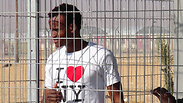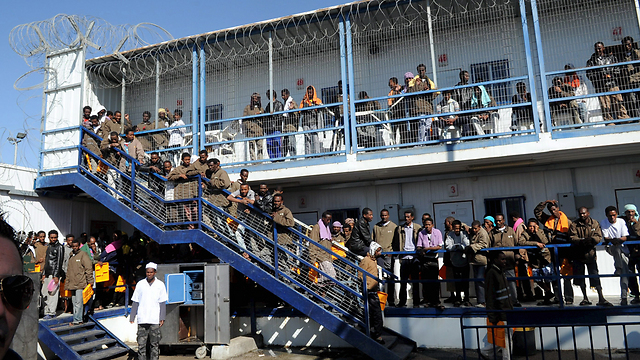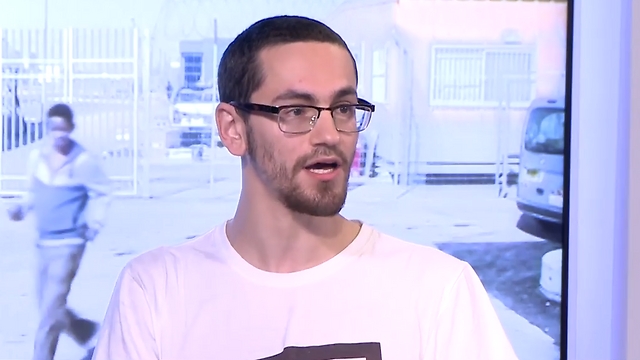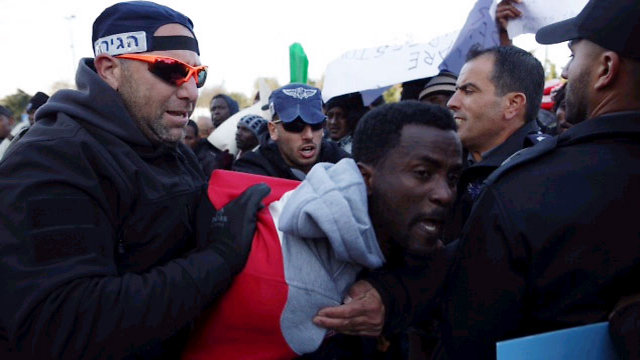

Israelis refuse to 'turn blind eye' to migrant expulsion
Organization called 'Stop the expulsion' seeks to annul government decision on deporting African asylum seekers; 'Israel about to deport people to mortal danger. It's a disgrace, public is responsible,' says group's leader; Population and Immigration Authority commences recruitment drive in anticipation of deportation.
"Stop the expulsion" leader Yoav Klarman further expounded, "The country is about to deport people to mortal danger. It can't just pass on by with tut-tutting, with people straddling the fence and not taking a stand."
"It's a disgrace, and the public is culpable. Responsibility can't be levied at the High Court or public officials—it's the public's job to make itself heard on this matter," Klarman said.

"Stop the expulsion," Klarman said, was a "spontaneous organization, with many citizens now deciding they simply won't turn a blind eye."
Israel was not even reviewing the requests of asylum seekers, Klarman claimed, and up until now only 11 people were granted the status of refugees—out of a total of about 70,000.
"That means we're in the midst of the gravest refugee crisis since World War II. What is Israel's shouldering of this burden? Eleven people," he accused.

In Klarman's opinion, the government couldn't care less where those people ended up, as attested by Rwanda and Uganda's position. "It's clear no one really knows the situation. The only thing the government cares about is reaping electoral gains over what's happening in south Tel Aviv, with residents' distress," he said.
Asked whether his own organization considered locals' plight, Klarman said the answer was an unequivocal yes. "Saying you have to choose between the interests of the people of south Tel Aviv and the State of Israel or caring for human life—it's not true. We demand that the budget we so frivolously throw away at Holot and Saharonim (migrant detention facilities—ed), the money invested in this clandestine agreement will instead be invested in policy.
"The state dumped them in south Tel Aviv to begin with. We have a recording of the south Tel Aviv district police chief saying they have no intention of removing them. It's all about gentrification and construction now."
In conclusion, Klarman added that if Israel had enacted a fair and equitable policy, it would not have left tens of thousands of migrants living "among Israel's weakest population, which has to shoulder this burden instead of the state. We say we have to form policy. Fix south Tel Aviv, and it is fixable."
Population and Immigration Authority undertakes recruitment drive
The Population and Immigration Authority, meanwhile, is continuing preparations for the migrants' deportation, and is set to commence a drive Monday to recruit 140 employees, including 100 inspectors, to help carry out the plan to expel Eritrean and Sudanese migrants—either through "willing expulsion" to Rwanda or Uganda or through imprisonment at Saharonim or deportation to those countries.
According to the wanted advertisements the Authority will publish in newspapers starting Monday, it is seeking personnel in three areas: 70 immigration inspectors for enforcement missions against illegal aliens, 30 inspectors to carry out the "willing expulsion" arrangement and 40 employees for the RSD department, which deals with asylum requests.
This recruitment process will last two weeks, and when it concludes new employees will beginning training that will last through March, after which the Holot facility will be closed and enforcement will commence against migrants who refuse to leave willingly.
Head of the Authority's Enforcement and Foreigners Administration Yossi Edelstein stressed to Ynet inspectors' role was to maintain contact with the migrants after they leave and make sure they are doing well. "They're responsible for review vis-à-vis the third country," he said. "We contact the people who leave and ascertain they get everything they need."
While immigration inspectors have yet to remove Eritrean or Sudanese nationals from Israel, they will begin doing so in April, hence the need to bolster their numbers.
While the goal was to deport them migrants to Africa, Edelstein said so long as they were in Israel the Authority's inspectors were tasked with making sure they are paid their rights in full by their Israeli employers.
"We enforce their labor rights—wages, conditions, medical insurance and so on," Edelstein said. "We don't want employers to be able to take advantage of their weakness."
"We do hope they'll cooperate, receive their grant and leave, because we don't want to have to begin enforcement measures," Edelstein concluded.

















